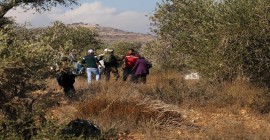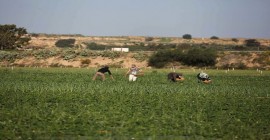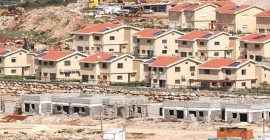Shtayyeh: The occupation control over the Jordan Valley incurs us millions of shekels
Transalted by Sabrin Qadah
This came during a field tour of several archaeological sites and economic sites in the Dead Sea and the Jordan Valley with ambassadors and consuls of the European Union countries, including France, Britain, Germany, Sweden, Ireland, Cyprus, Malta, Spain, Lithuania and Italy.
The tour was organized in coordination between the European Union Office and the PLO's Negotiations Affairs Department, with participation of the Governor of Jericho Majid Al-Fityani, alongside with D. Shtayyeh, and a number of Palestinian businessmen and investors in the Jordan Valley.
Shtayyeh said that the Palestinian losses due to Israel's control over areas "C" are estimated at more than 3.4 billion dollars annually, according to a World Bank report, stressing that the occupation seeks to convince the world that its control of the Jordan Valley, which accounts for 28% of the West Bank, is led by security reasons, but in fact, it is for economic motives as it gives Israel hundreds of millions of shekels
Shtayyeh briefed the delegation on the economic opportunities lost due to the lack of control over the Jordan Valley and the Dead Sea. He pointed out that the Dead Sea is the most important reservoir of minerals such as Potash, Magnesium and Phosphate, which Palestinians are deprived of, while producing millions of dollars for Israel.
He added that while Palestinians are also deprived of investment on their shores on the Dead Sea or even access to them, Israel is building 15 hotels overlooking the sea, which generate about 300 million dollars and employ about 3000 workers, and Jordan in the opposite direction is building 5 hotels that generate about 128 million dollars and employ about 1,500 workers.
He pointed out that Israel's income from cosmetics produced from the Dead Sea exceeds 150 million dollars, most of which goes to the company "Ahava".
From Khirbet Qumran site, which was included in the tour, Shtayyeh briefed the delegation on the losses resulting from the occupation's control of archaeological areas such as Qumran, Wadi al-Qalt and Ain Fashkha.
He mentioned that some 375,000 tourists visit Qumran annually, generating more than $ 2.05 million from entrance fees only.
He added that the site is one of the most important archaeological discoveries in the twentieth century, where found the Dead Sea manuscripts that belong to the Essenes, people who lived in the place less than a century BC.
Shatyyeh assured the European delegation that the Palestinian version of the archaeological sites does not eliminate any religion or civilization, as the Israelis do by trying to deny the existence of the other and seize its history and heritage, "but we cherish the richness of the Palestinian history and diversity, and our being in the land of religions and civilizations."
For his part, Al-Fityani said that Israel is exploiting the water resources for its agricultural projects and to provide the well-being of its settlers, while the Palestinian farmers suffer from a severe shortage of water, which impedes the chances of establishing large investment projects.
He pointed out that as a result of the occupation’s control over water resources in the Jordan Valley, the Palestinians are forced to buy it at high prices. About 8% of the Palestinian family's expenditure in the Jordan Valley goes for water consumption, while the percentage of settlers is only 0.9%.
The governor briefed the audience on the dangers of Israeli settlement expansion, pointing out that the year 2016 alone witnessed the declaration of occupation of about 2,342 acres between the Dead Sea and Jericho as state land to be used later for settlement activity.
For his part, the EU Representative to Palestine, Ralph Trav, said the tour contributed to closely introducing the European ambassadors and consuls on the results of Israeli control over the areas of the Jordan Valley and the Dead Sea, and explained to them the negative economic effects of Israeli actions on various sectors of the Palestinian economy.
The delegation met with a group of Palestinian investors in the Jordan Valley, who explained the difficulties of investment in this region. The occupation policies are hindering most forms of investment. They also stressed that the lack of control over the crossings and borders limits the development of the Palestinian economy.





